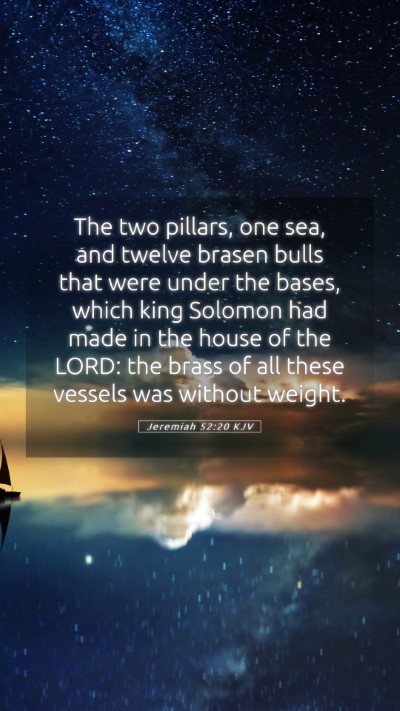Understanding Jeremiah 52:20
Bible Verse: Jeremiah 52:20
This verse reflects on the significant elements of the Jerusalem temple and emphasizes the instruments and materials used in its service, which were of great value and importance to the Israelites.
Overview of the Verse
Jeremiah 52:20 states:
“The two pillars, the bowls, and the vast brasen sea that were in the house of the Lord, which Solomon had made, were of brass: and the weight of the brass of all these vessels was without weight.”
Contextual Background
In understanding the passage, it is essential to consider the historical context during which Jeremiah prophesied. The fall of Jerusalem and the destruction of the temple occurred in a period marked by disobedience and moral decay among God’s people. The mention of these sacred objects signifies the loss of what was symbolic of God's presence among His people.
Commentary Insights
Matthew Henry's Commentary
Henry emphasizes the grandeur and beauty of Solomon's temple, especially the pillars and the brazen sea that represented God's strength and majesty. He notes that these items held symbolic meaning, reflecting God's covenant with Israel. Their destruction not only represents physical loss but also spiritual devastation.
Albert Barnes' Notes
Barnes explains that the mention of the pillars indicates God's judgment against Jerusalem. The use of brass symbolizes strength, and the sheer weight of the items is a metaphor for the heavy burden of sin upon the nation, suggesting that the loss of these vessels is a tragic loss of divine favor.
Adam Clarke's Commentary
Clarke elaborates on the craftsmanship and beauty of these vessels, highlighting their significance in worship. He interprets the weight of the brass as not just a physical attribute, but also an allegory for the weight of Israel's iniquity before God. The destruction illustrates a profound warning against turning away from divine statutes.
Theological Implications
This verse serves as a stark reminder of the consequences of sin and the importance of maintaining a right relationship with God. The temple, a place of worship and sacrifice, represents divine connection, and the loss of its vessels reflects the severance of that connection due to the people's disobedience.
Applications to Daily Life
From Jeremiah 52:20, believers can glean important lessons about the significance of maintaining spiritual integrity and the weight of sacred duties. This passage invites reflection on personal worship practices and the importance of valuing the tools and spaces designated for God's service.
Cross References
- 1 Kings 7:15-22: This passage details the construction and significance of the temple's pillars.
- 2 Chronicles 36:17-19: It describes the destruction of the temple and the sacred objects being carried away.
- Isaiah 22:9-10: This signifies the significance of fortifications and sacred vessels in times of calamity.
- Ezekiel 10:18: It discusses the departure of God's glory from the temple, emphasizing the consequences of disobedience.
Conclusion
Jeremiah 52:20 provides profound insights for those seeking Bible verse meanings and Bible verse interpretations. Understanding this verse can enhance Bible study insights in group settings or online Bible study formats. The historical and spiritual dimensions discussed here contribute to a deeper Bible verse understanding and Bible verse commentary.
As individuals engage in Bible study lessons or seek Bible study guides, they are encouraged to explore the implications of this verse in their lives today. Reflecting on the weight of spiritual responsibilities can lead to a more profound appreciation for the elements of faith and worship.


